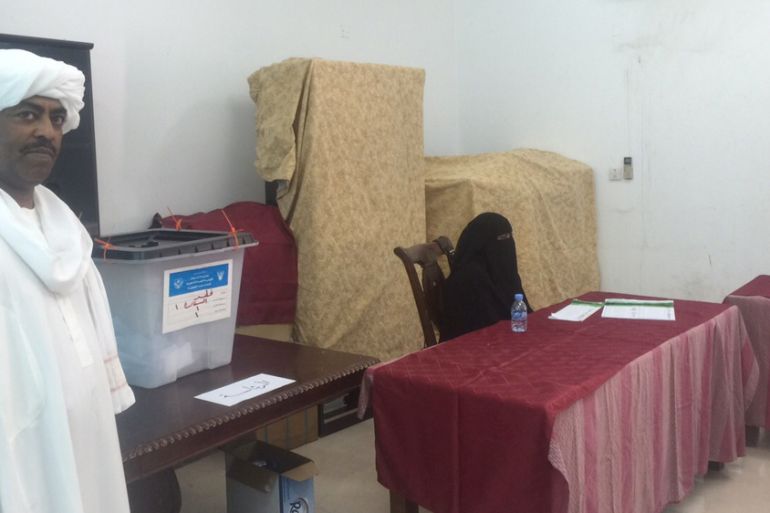Sudanese expatriates apathetic about presidential vote
With voting set to close in embassies around the globe, many say President Bashir’s victory is a foregone conclusion.

Amid reports of low voter turnout in Sudan, the overwhelming mood among Sudanese voters at home and abroad appears to be unprecedented apathy.
The head of the African Union (AU) observer mission and former Nigerian president, Olusegun Obasanjo, estimated that only about one-third of eligible voters had cast their ballot. The mission’s presence comes despite an African Union pre-election assessment report which concluded that “the necessary conditions and environment for the holding of transparent, competitive, free and fair elections, as agreed in the AU principles governing democratic elections, have not been satisfied”.
For many, the election result is a foregone conclusion as President Omar al-Bashir, head of the National Congress Party (NCP), completes his 26th year in power. Bashir, 71, led a military coup in 1989 and had claimed previously that he would not stand for re-election.
INFOGRAPHIC: Sudan: Elections 2015
As polls closed internally on April 16, following a one-day extension due to low voter turnout, they opened on April 17 for three days for Sudanese nationals living abroad to vote. Sudan’s National Election Commission (NEC) has organised for Sudanese citizens in seven countries to cast their votes, covering the areas with the most populous diasporas: Saudi Arabia, Egypt, Qatar, Oman, the UAE, the UK, and Belgium – the latter acting as a centralised hub for mainland Europe. Their ballots will be sent to Sudan for final computation and the overall results of the election are scheduled to be announced on April 27.
Forty-four political parties are competing to win seats in Sudan’s National Assembly, while 15 candidates are officially running for the presidency.
But Mohammed Ibrahim, a 27-year-old IT student in Malaysia, told Al Jazeera that because the main “opposition parties are boycotting the elections”, including the Ummah Party and the Democratic Unionists, he would not be voting. “They are the reason this election has become pointless. If they had participated, I would have voted,” Ibrahim told Al Jazeera.
I love my country and I want to see it develop. But those with a vision and the tools to improve our economy are being forced out. Bashir's government has failed its people.
Amjed AbdulHakeem, 34, a microbiologist who has lived in Jeddah for the last two years, has a common story: He studied in Sudan, struggled to find work and eventually moved to Saudi Arabia, where he now works in a large hospital laboratory and sends money home to support his family.
“Election?” He laughs: “That assumes there is a choice. If I knew the result wasn’t already 100 percent determined, I might have been interested in voting, but I won’t take part in this charade.”
AbdulHakeem’s views are common among Sudanese expatriates, who reside at a distance of relative safety from the Sudanese National Intelligence and Security Services (NISS) and can express their views more freely. According to Amnesty International, “during the 2010 general elections, the NISS intimidated, arrested, and detained opposition candidates, voters, and human rights defenders”. Sudan’s parliament has also recently approved amendments to its interim constitution, further expanding the role of the NISS.
In Qatar, Sudanese Ambassador Yasser Khadir told Al Jazeera that there were only “approximately 7,000 Sudanese nationals registered to vote out of the 50,000 resident here”.
“Sudanese nationals are involved in all levels of society in Qatar, from engineering and management to sports and policing,” Khadir said. However, he estimated that only “664 voters had cast their ballot so far” after the first day of voting.
Many Sudanese nationals left Sudan as refugees following the first civil war with the region now known as South Sudan, in 1955. The more recent waves of expatriates are economic migrants. Many families in Sudan have members working abroad and rely on remittances to survive.
Abra Daifallah, a 17-year-old pharmacy student, moved with her family to Doha five years ago. “I am excited to participate in my first election and cast my vote,” she told Al Jazeera. “This is my right. All of my family in Sudan will be voting for Bashir too.”
RELATED: Sudan: Dear Candidate, don’t bother knocking
This is the second set of elections under Bashir’s rule; the first occurred in 2010 and was monitored by the European Union. This time, however, the EU has declined to attend, stating: “The upcoming elections cannot produce a credible result… The people of Sudan deserve better. We therefore chose not to engage in support of these elections.”
Retired businessman Ahmed Idris, 75, opted to settle in London, viewing it as the business epicentre of the world and with hopes of being able to provide a quality education for his three children. In the 1990s, Idris says, he was formally asked to leave Sudan by the Ministry of Justice, following a legal business dispute with Bashir’s government.
“I was unjustly arrested multiple times and had my land seized. I was unable to continue, and unfortunately my story is not unique,” he said.
Idris believes that living outside Sudan does not prohibit one from engaging with Sudanese politics: “I love my country and I want to see it develop. But those with a vision and the tools to improve our economy are being forced out. Bashir’s government has failed its people.”